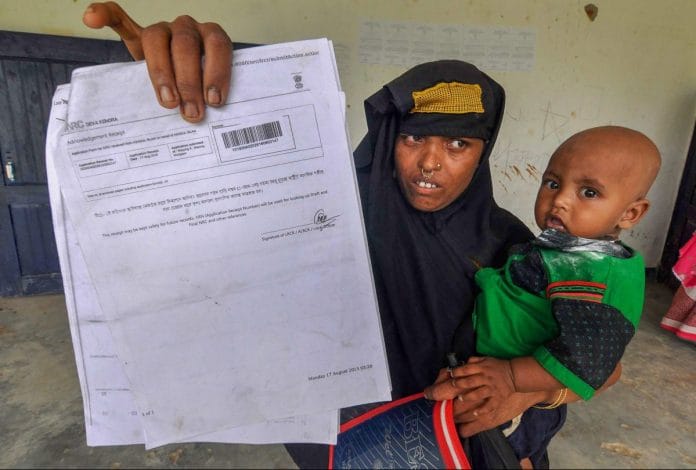Assam’s NRC has become a political tool to create, protect and patronise vote banks, but ignores social, security, economic and humanitarian costs.
The debate around Assam’s citizenship registry has its roots in the time when India was partitioned, and West Pakistan and East Pakistan (now Bangladesh) were created. That is when all the hair-splitting on deciding the parameters of citizenship began. Hindus and Sikhs poured into India, Indians migrated to West and East Pakistan, and some returned.
But the Constituent Assembly did a commendable job and mandated the compilation of a National Register of Citizens (NRC).
Assam has the unique distinction of being the most populous, infiltrated and troubled northeastern state as far as the question of citizenship and identity politics is concerned. From being ‘ruled by a foreigner (meaning Bangladeshi)’ to ‘being a minority in Assam’ many such apprehensions have influenced the political discourse of the state. The final draft of the NRC has opened a Pandora’s Box that was tightly shut for some time in the best interests of the state.
Also read: Assam’s citizens’ registry mess shows ‘India is for Indians’ notion is hypocritical
Assam shares a 262 km-long border with Bangladesh out of the 4,156 km border between India and Bangladesh, considered to be fifth longest land border in the world. Large tracks of land along the border on the riverside were cultivable but least used. While the Green Revolution tried to solve this, the problem of infiltration in Assam is also attributed to the same Green Revolution project when a large number of agricultural labourers were allowed to settle along border areas.
As central government funds began to pour in, another problem surfaced in the form of United Liberation Front of Assam (ULFA) separatism resulting in making large chunks of the Indo-Bangladesh border highly vulnerable to illegal trafficking of all kinds. This allowed the entry of illegal migrants who essentially were looking for low paid jobs in paddy fields and the transportation of goods back home. The Bangladesh Liberation War of 1971 witnessed yet another phase of mass influx of immigrants, this time mostly Hindus.
By this time, the pre-1971 immigrants had moved to cities and acquired voter cards, ration cards and other identities. Some of them even became landowners and exercised great political influence. This triggered a sense of disquiet among the locals who were now gripped with a ‘Bangladeshi takeover’ fear.
Taking advantage of the situation, the All Assam Students’ Union (AASU) and Asom Gana Parishad (AGP) raised the issue of updating the 1951 NRC and a fresh enumeration of voters to weed out ‘doubtful voters’ called the ‘D’ category. The mass agitation that enjoyed the support of the people successfully culminated in the signing of the Assam Accord in 1985, which marked the midnight of 24 March 1971 as the cut-off date for granting citizenship to illegal immigrants.
Also read: In Assam, NRC is now National Register of Confusion
But the ‘oust Bangladeshi’ issue gained momentum and became a pan-India political slogan finding its way to manifestos of political parties, more prominently that of the BJP. The NDA government promptly brought in the Citizenship Amendment Bill in 2016. During the 2014 general election, the BJP in its election manifesto had promised to grant citizenship to Hindus persecuted in neighbouring countries. Ironically, an ally of the BJP in Assam, the AGP, threatened to sever relations with the BJP as it considered the Bill to be against the cultural and linguistic identity of the indigenous people of the state and diluting their political clout. Incidentally, the latest final draft of NRC just did the same thing and accepted the 1971 cut-off.
Not all of the nearly 40 lakh persons left out of the final draft of the NRC list are outsiders. Then, there is also the question of poor Hindu families who have been hounded out of Bangladesh because they were the ‘oppressed religious minority’ there and are here as ‘sharanagat’ (asylum seekers) and not ‘bahiragat’ (outsiders).
There can be no two opinions on the question of identifying and deporting illegal immigrants. But a larger issue is of identifying, determining the nationality of these illegal entrants and then deporting them. New Delhi has faced this problem many times. Dhaka has flatly refused to own these people. Nor can any state keep such people in refugee camps forever. There is also the fear of some of them joining the Rohingya Muslim bandwagon.
Also read: NRC shows Supreme Court has made a messy issue messier
There have been suggestions in the past to issue work permits to such persons, and utilising them in agriculture and commercial activities. This arrangement would stop short of letting them acquire property or land, any form of identity card and vote. Instead of converging on solutions, there seems to be an indecent haste among parties to use this issue as a political springboard to power.
It is for saner elements (if any) in parties and the society to address this issue from a national security, diplomatic and humanitarian angle and find a lasting solution.
The author is the former editor of ‘Organiser’.






